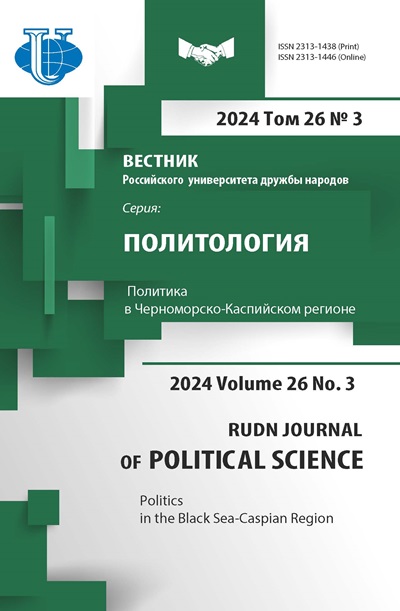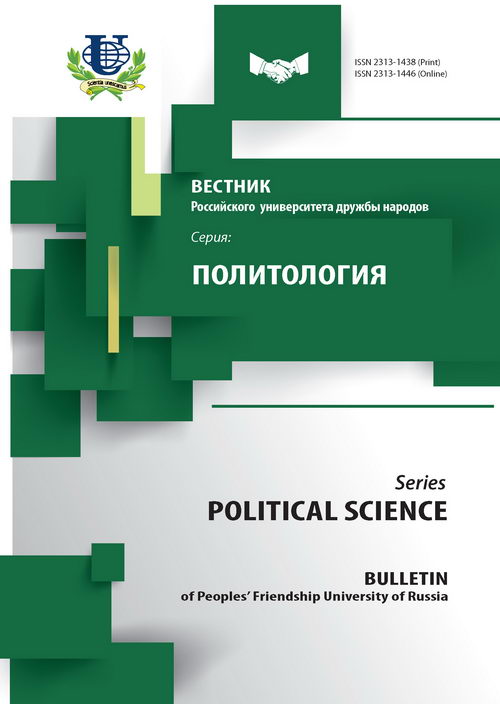No 2 (2015)
- Year: 2015
- Articles: 9
- URL: https://journals.rudn.ru/political-science/issue/view/544
- DOI: https://doi.org/10.22363/2313-1438-2015-2
ARTICLES and REVIEWS
Russia’s Policy In The Arctic Continent: Contemporary Challenges
Abstract
In the given article there are viewed the main stages of contemporary Russian politics in the Arctic and analyzed the main problems that Russia faces in realization of its interests in this region. Special attention is paid to the Russia’s approaches to solving of the key problems of the region such as international regime and the prospects of production of carbohydrates in the Arctic.
 7-22
7-22


The Problem Of Influence Of The Relations Between Afghanistan And Iran On The Political Situation In The Region And A Way To Improve It
Abstract
In the given article, the interrelations of Iran and Afghanistan are analyzed. The author supposes that the main objective of strengthening the position of Iran is to prevent the formation on the territory of Afghanistan the conditions that could pose a security threat to the Iranian state by the leading powers of the West, or to be used as a tool of coercive pressure on Tehran. The authors presumes that in order to increase its influence in Afghanistan, Iran will continue to contribute to the socio-economic reconstruction, however, the nature and direction of his help will be largely dependent on the military-political situation, and, above all, how long on Afghan territory will continue its military presence in Western countries.
 23-35
23-35


«Charts Power» - International Ratings As An Economic Weapon And A Tool Of Soft Power. Part I
Abstract
In the given article, the authors propose and operationalize the notion of “charts power” (or “index power”, “ratings power”) as a significant component of soft power of national states and international institutions. The authors prove that numerous comparative ratings of different countries that have become extremely popular in recent decades could be used as an economic weapon and an effective tool of influence. The article analyses the mechanisms of ratings power and emergence of “rating thinking”. The authors conclude about the importance of actual and potential threats to national security of the Russian Federation from charts power of the foreign states.
 36-51
36-51


Turkish Soft Power: The Phenomenon Of “Soap Power” As A Tool Of Cultural Diplomacy
Abstract
The article discusses the phenomenon of Turkish soap operas as a tool of soft power. The author analyzed the character, scope and limits of this phenomenon, primarily regarding the case of the Middle East countries and societies. The article covers the process of dissemination and implementation of the ideas of neo-Ottomanism as the foreign policy concept through applying the soft power strategy. Following the results of the research, the conclusion has been made regarding the negative and positive effects of this phenomenon on various spheres, as well as in the context of Turkish foreign policy.
 52-62
52-62


Rethinking The Category Of Revolution
Abstract
The subject of the study is the category of revolution. The author tries to understand how revolution as a legitimate government overthrow of a sovereign nation works as a concept in current political situation. In her view, since the Islamic Revolution in Iran it becomes quite impossible to classify the revolution as the bourgeois and socialist, since 1991 - to talk about it in line with the theory of change of social formations. In her article the author analyzes the results of the overthrow of the government during the revolution as a legitimate act, and explains why, in her view, the concept of the revolution is “dead”. The category of revolution is studied by the author through techniques of political Conceptology. As the methods of investigation the author used comparative, historical method, and methods of analytic philosophy. The main conclusion of the study is the exhaustion of modern concept of revolution because of its ambiguity and elevated semantic load, which are stretching the notion of enabling and legitimizing any illegal overthrow of the government, including those which are not in the interests of “sovereign nation”. The concept of revolution in the way in which we are accustomed to perceive it, has exhausted itself, because it consists of continuous fiction, but in today's world radically change the structure of suppression and oppression.
 63-82
63-82


The Structure Of The Political Elites In Polyethnic Republics Of The North Caucasus
Abstract
This article describes the features of the motion, the channels of recruitment and aspirations of the elites in the North Caucasus. It is important to keep track of the role of political elites to control the interaction in the region, to identify their interests, resources, influence, positive and destructive factors in their activities. The article analyzes the ethnic composition (proportional representation of titular nations, the principles of parity) in representative government in the North Caucasus (Dagestan, Adygea, Kabardino-Balkaria, Karachay-Cherkessia), mechanisms of occurrence of ethnoelites to the state and municipal authorities. During the formation of public authorities in the region, the political leadership of the country since the Soviet era adhered to “ethnicity”, “national quotas”. But at the present stage of development of the political system in Russia, the federal center began to use democratic mechanisms of local authorities, which makes regional political elites to seek new approaches in the political struggle.
 83-89
83-89


The Concept Of Policy Networks: The Transition To A Study Of Qualitative Characteristics And Its Value For Political Theory And Practice In Russia
Abstract
This article analyses the most relevant aspects of the policy networks concept. On the example of a number of issues, the change in focus of scientific interest in this approach found out. In that case, we examine the heuristic potential and applicability of this theory in the Russian political science and political practice. In addition, the author names the most important Russian specialists in policy networks theory and reviews some of their works that include method of policy networks analysis.
 90-103
90-103


 104-111
104-111


On Our Authors
 112
112
















